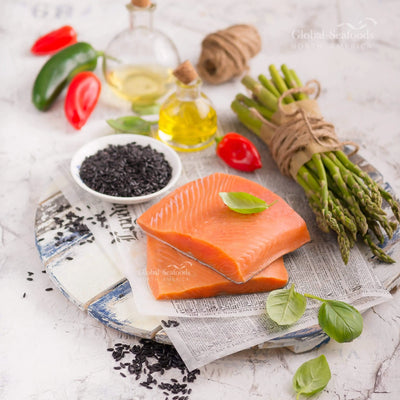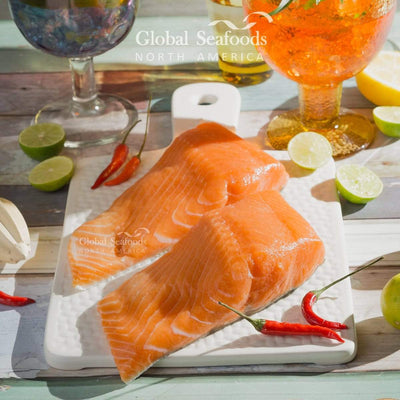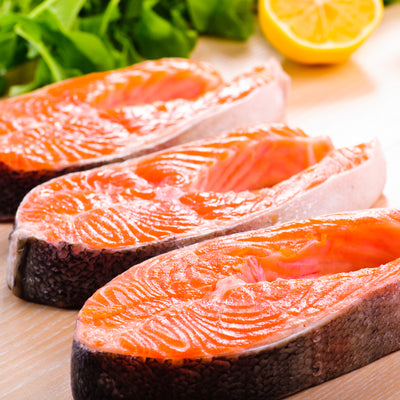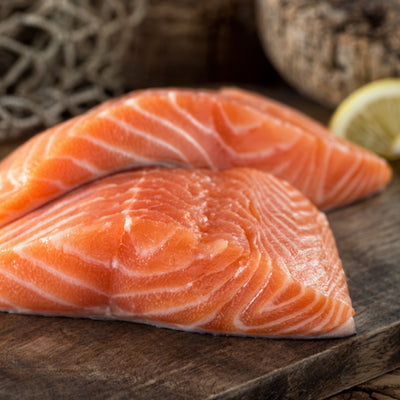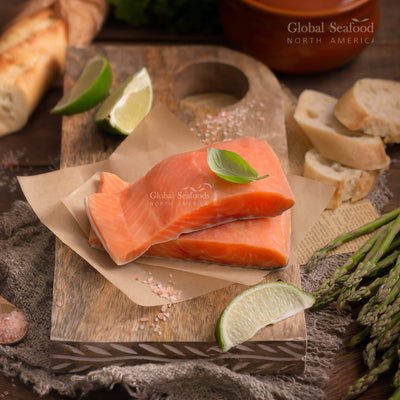How to Store Wild Salmon for Maximum Freshness and Flavor

How to Store Wild Salmon Properly: The Ultimate Guide to Keeping It Fresh
Wild salmon is one of the most sought-after seafood options, prized for its rich flavor, firm texture, and high nutritional value. However, to enjoy its full benefits, proper storage is crucial. Whether you’ve purchased fresh, frozen, or smoked wild salmon, knowing how to store it correctly will prevent spoilage, preserve quality, and maintain its rich taste.
In this guide, we’ll cover how to freeze, thaw, and refrigerate wild salmon to keep it fresh and delicious for as long as possible.
Why Proper Storage of Wild Salmon Matters
Unlike farmed salmon, wild-caught salmon has a more delicate texture and a higher natural oil content. This means it can spoil quickly if not handled properly. Incorrect storage can lead to:
✔ Loss of Freshness – Wild salmon’s delicate flavor can deteriorate quickly.
✔ Texture Changes – Improper freezing can cause ice crystals to form, making the fish dry and rubbery.
✔ Food Safety Concerns – Bacterial growth can lead to foodborne illnesses.
By following proper storage techniques, you can extend the shelf life of wild salmon and enjoy its superior taste and texture in all your favorite recipes.
🔗 Shop the Best Wild-Caught Salmon Here
How to Freeze Wild Salmon Correctly
If you’re not planning to cook your wild salmon right away, freezing is the best way to preserve its freshness.
1. Maintain the Right Freezing Temperature
Set your freezer to 0°F (-18°C) or lower. Keeping salmon at this temperature prevents bacterial growth and maintains its firm texture.
2. Choose the Best Packaging for Freezing
To prevent freezer burn, make sure your salmon is stored in airtight packaging.
✅ Vacuum-Sealed Bags – The best option to remove air and keep the fish fresh.
✅ Plastic Wrap & Aluminum Foil – Wrap the salmon tightly with no air pockets before storing it in a freezer-safe bag.
✅ Airtight Containers – Ensure minimal air exposure to prevent freezer burn.
3. How Long Can You Freeze Wild Salmon?
- Fresh Raw Wild Salmon: Up to 3 months
- Cooked Wild Salmon: Up to 2 months
- Smoked Wild Salmon: Up to 6 months
👉 Pro Tip: Label the packaging with the freezing date so you can track how long it has been stored.
🔗 Buy Fresh Wild Sockeye Salmon
How to Thaw Wild Salmon Safely
Thawing salmon correctly is just as important as freezing it. Avoid thawing at room temperature, as this can cause bacterial growth.
1. Refrigerator Thawing (Best Method)
For optimal texture and safety, place the frozen salmon in the refrigerator overnight.
⏳ Thawing Time: 6-12 hours
2. Cold Water Thawing (Faster Option)
If you need to thaw salmon quickly, submerge the sealed salmon package in cold water. Change the water every 30 minutes to maintain a safe temperature.
⏳ Thawing Time: 1-2 hours
3. Cooking Frozen Wild Salmon (No Thaw Needed!)
If you’re in a rush, you can cook wild salmon directly from frozen.
🔹 Baking: Add 5-7 extra minutes to cooking time.
🔹 Grilling: Use indirect heat to prevent uneven cooking.
🔹 Pan-Searing: Start with low heat, then increase gradually.
🔗 Get High-Quality Wild Alaskan King Salmon
How to Store Wild Salmon in the Refrigerator
1. Storing Fresh Wild Salmon
If you plan to cook your wild salmon within 1-2 days, keep it in the coldest part of your refrigerator at 32°F - 38°F (0°C - 3°C).
✅ Keep it wrapped in plastic wrap or parchment paper.
✅ Store in an airtight container to prevent cross-contamination.
2. Storing Cooked Wild Salmon
If you have leftovers, store them in an airtight container in the fridge.
⏳ Shelf Life: Up to 3-4 days
3. Storing Smoked Wild Salmon
Smoked salmon has a longer shelf life but still needs proper storage.
⏳ Shelf Life: 2 weeks (unopened), 5-7 days (after opening)
🔗 Order Premium Smoked Wild Salmon
Signs That Your Wild Salmon Has Gone Bad
Not sure if your salmon is still fresh? Look for these warning signs:
❌ Strong, Fishy Smell: Fresh wild salmon should have a mild ocean scent. A sour or ammonia-like odor is a sign of spoilage.
❌ Discoloration: If the salmon has gray, brown, or dull patches, it’s no longer fresh.
❌ Slimy Texture: A sticky or slimy film means bacteria has started growing.
❌ Excess Ice Crystals: Large ice formations indicate freezer burn, affecting taste and texture.
Frequently Asked Questions About Storing Wild Salmon
1. How Long Can Wild Salmon Stay in the Fridge?
Fresh raw wild salmon lasts 1-2 days, while cooked salmon lasts 3-4 days in the refrigerator.
2. Can You Refreeze Thawed Wild Salmon?
Yes, but only if it was thawed in the refrigerator and has not been left out for more than 24 hours.
3. Should I Wash Wild Salmon Before Storing It?
No, washing raw salmon can spread bacteria. Instead, pat it dry with a paper towel before storing.
4. How Can I Prevent Freezer Burn on Wild Salmon?
Use vacuum-sealed bags or double-wrap with plastic wrap and foil before freezing.
5. Can I Store Wild Salmon in the Fridge Without Cooking It?
Yes, but it should be cooked within 1-2 days to ensure freshness.
Final Thoughts: Keep Your Wild Salmon Fresh & Delicious
Properly storing wild salmon ensures that you enjoy safe, flavorful, and high-quality seafood every time. By following these simple tips on freezing, thawing, and refrigerating salmon, you can maximize its freshness and savor every bite.
For the best wild-caught salmon, check out Global Seafoods, where you can find premium sockeye, king, coho, and smoked salmon delivered straight to your door!
🔗 Shop Fresh & Frozen Wild Salmon Today!
➡ Buy Wild-Caught Salmon Online
➡ Shop Sockeye Salmon Fillets
➡ Order Smoked Wild Salmon
By following these storage methods, you can ensure that your wild salmon stays fresh, flavorful, and ready to enjoy whenever you crave a delicious seafood meal! 🐟🔥
Also in News

The Boiled Crab in Popular Culture: From Cajun Cuisine to Trendsetting Restaurant Phenomenon
From spicy Cajun-inspired seafood boils to hands-on dining experiences, The Boiled Crab has left a unique mark on popular culture. Discover its cultural roots and culinary influence.

Boiled Crab for Game Night: Everything You Need for a Perfect Seafood Party
Take your game night to the next level with a Boiled crab party. Learn the best recipes, cooking tips, and hosting hacks for a memorable seafood feast.

Boiled Crab for Date Night: A Romantic Guide to the Perfect Seafood Feast
Make your next date night unforgettable with a romantic Boiled crab experience. This guide covers everything you need to know, from ambiance to the best crab varieties.


